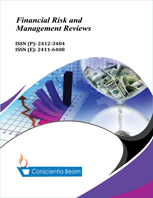Evaluating the Model of Demand for Money in Nigeria
DOI:
https://doi.org/10.18488/journal.89.2020.61.1.13Abstract
In Nigeria, demand for money is frequently affected by factors that regularly experience shocks in the economy. Therefore, regular adjustment and reforms are done to monetary policy which creates a lot of uncertainties in the market. This paper therefore examined the demand for money (narrow money, M1) in Nigeria, using quarterly time series data from 2006 to 2018, the study attempted multiple OLS regression analysis and ARDL. The result found out that money demand function cannot be appropriately estimated by OLS estimation technique due to the presence of the lagged value of both the dependent and independent variables. Although, the no long run relationship among the variables but the result indicates that M1 is largely influenced by inflation, exchange rate, MPR (Monetary Policy Rate), and savings as well as real GDP to some extent; particularly in the short run. It was observed from the analysis that economic units in Nigeria are shedding more of cash assets (Naira) as inflation increases while stocking up on foreign cash and assets (dollar and foreign denominated assets) as shown by the positive-related exchange rate.

